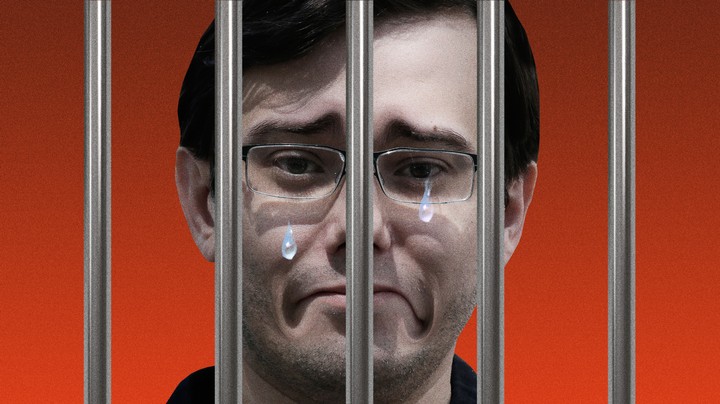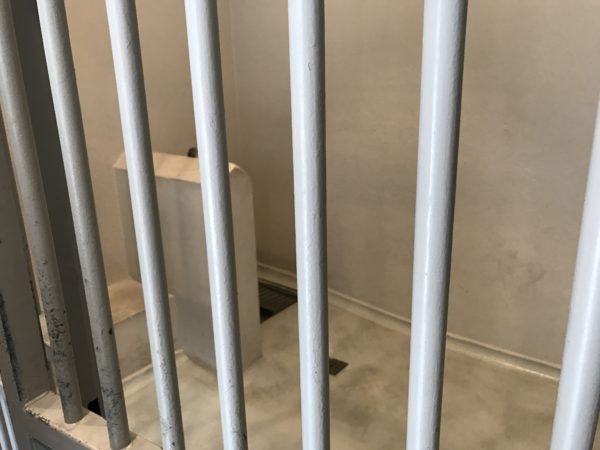The infamous pharma bro just asked to be placed in a minimum-security “camp” facility. Here’s what current federal prisoners think he has coming.

Right before he was sentenced to 84 months in federal prison last Friday, “pharma bro” Martin Shkreli broke into tears. Ultimately, the man convicted on three counts of fraud did not get the maximum possible sentence he faced—much less the 21 years I endured in the feds for drug crimes. Even so, the federal Bureau of Prisons (BOP) will be Shkreli’s home for the foreseeable future, and the New York Daily News reported Wednesday he’s hoping to land in a minimum-security “camp” facility in Pennsylvania best known for a salmonella outbreak.
I’ve been out of prison for over three years, but still have plenty of friends inside the belly of the beast, albeit mostly for crimes that have nothing to do with hedge funds or biotech. Still, after Shkreli’s sentence was handed down, I couldn’t help soliciting current federal inmates’ expert opinions on how the “most hated man in America” might get treated behind bars. What emerged was a general consensus that the nature of his crime, along with Shkreli’s money and high-profile, meant he was unlikely to land in a facility where Oz-style brutality was endemic. Even so, his unique role as a cultural lightning rod—and especially his status as a pharmaceutical price-gouger—could cause him some extra trouble.
“I think that Martin Shkreli will slip between the cracks in prison, because he will more than likely go to a camp where there is no violence,” Walter “King Tut” Johnson, a New Yorker doing life at FCI Otisville on a federal three-strikes law conviction, told VICE in an email. “He will hate being locked up period, though, and probably do a little protesting. If he cries in prison like he did at sentencing, it better be genuine, because tears in prison are taken seriously.”
In Tut’s experience, prison tears are for the loss of a loved one, incurable illness, or grieving by a person who is truly innocent. Which is to say sobbing from Shkreli over the state of his new digs could be seen as an insult to seasoned convicts—an act of selfishness that might become a “jacket” hanging over him for his whole bid.
“Once he gets to prison, he’ll be minimum security,” agreed Christian Fannon, a former Ohio resident doing five years at FCI Beckley in West Virginia for forging drug prescriptions. “Most federal prison camps are super soft. He will be able to actually live decent. If he went to higher security, they’d eat him up. He’d have to pay protection and his money would be his safety.”
No matter where he lands, thanks to his saturation media coverage and propensity for thumbing his nose at the public, Shkreli will face the possibility of being singled out for abuse. But even at low-security camps, every inmate has something to lose, and no one wants to go back behind a fence (a.k.a. a higher-security facility) for smacking up a “lame,” as Shkreli may be dubbed.
The man’s profile as a professional troll, however, could complicate his stay.
“Given Shkreli’s inexperience as an inmate, the fact that it’s public knowledge that he still has a lot of money, and his overall spoiled-brat, rich-boy attitude, he’ll make a nice target for the press game,” Robert Rosso, a former prison gang member doing life for drugs at FCI Terre Haute in Indiana and has written for VICE, told me in an email.
In other words, Shkreli may well find himself inclined to pay someone or a group of people what amounts to protection money. And he could be charged more for everything—sheets and blankets, food, contraband—all because of who he is.
Of course, with extra money comes plenty of advantages.
It’s true: I’ve seen plenty of high profile dudes with money coast in prison. Cash is the great equalizer. What Shkreli needs to watch out for is how his price-gouging of live-saving drugs might shape his status in an institution where there is a moral code—a hierarchy—albeit not one most Americans are familiar with.
“Shkreli was an true-blooded capitalist until he knowingly and intentionally price-gouged a pharmaceutical that he knew people depended on to stay alive,” Rosso told me. ”In that sense, he turned into the worst kind of drug dealer there is: someone who got off on playing God.”
Follow Seth Ferranti on Twitter.
*This piece originally appeared on VICE.




1 Comment
Great stuff, Seth. Of course he’s not in prison for price gouging. But, boy, is he easy to hate.